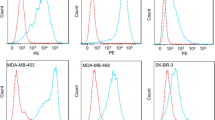Abstract
Athymic mice bearing xenografts of human tumours that overexpress the receptor (EGFR) for EGF and TGF alpha have been used to evaluate the therapeutic potential of three new rat monoclonal antibodies (mAbs) directed against two distinct epitopes on the extracellular domain of the human EGFR. The antibodies, ICR16 (IgG2a), ICR62 (IgG2b) and ICR64 (IgG1), have been shown (Modjtahedi et al., 1993) to be potent inhibitors of the growth in vitro of a number of human squamous cell carcinomas because they block receptor-ligand interaction. When given i.p. at 200 micrograms dose, the three antibodies were found to induce complete regression of xenografts of the HN5 tumour if treatment with antibody commenced at the time of tumour implantation (total doses: ICR16, 3.0 mg; ICR62, 1.2 mg; ICR64, 2.2 mg). More importantly when treatment was delayed until the tumours were established (mean diam. 0.5 cm) both ICR16 and ICR62 induced complete or almost complete regression of the tumours. Furthermore, treatment with a total dose of only 0.44 mg of ICR62 was found to induce complete remission of xenografts of the breast carcinoma MDA-MB 468, but ICR16 was less effective at this dose of antibody and only 4/8 tumours regressed completely. ICR16 and ICR62 were poor inhibitors of the growth in vitro of the vulval carcinoma A431, but both induced a substantial delay in the growth of xenografts of this tumour and 4/8 tumours regressed completely in the mice treated with ICR62 (total dose 2.2 mg). Although ICR16 and ICR64 were more effective than ICR62 as growth inhibitors in vitro, ICR62 was found to be substantially better at inducing regression of the tumour xenografts due perhaps to additional activation of host immune effector functions by the IgG2b antibody. We conclude that these antibodies may be useful therapeutic agents that can be used alone without conjugation to other cytotoxic moieties.
This is a preview of subscription content, access via your institution
Access options
Subscribe to this journal
Receive 24 print issues and online access
$259.00 per year
only $10.79 per issue
Buy this article
- Purchase on Springer Link
- Instant access to full article PDF
Prices may be subject to local taxes which are calculated during checkout
Similar content being viewed by others
Author information
Authors and Affiliations
Rights and permissions
About this article
Cite this article
Modjtahedi, H., Eccles, S., Box, G. et al. Immunotherapy of human tumour xenografts overexpressing the EGF receptor with rat antibodies that block growth factor-receptor interaction. Br J Cancer 67, 254–261 (1993). https://doi.org/10.1038/bjc.1993.49
Issue Date:
DOI: https://doi.org/10.1038/bjc.1993.49
This article is cited by
-
Molecular therapy of head and neck cancer
Cancer and Metastasis Reviews (2005)
-
Preclinical models for the evaluation of targeted therapies of metastatic disease
Cell Biophysics (1994)
-
The epidermal growth factor receptor as a target for therapy in breast carcinoma
Breast Cancer Research and Treatment (1994)
-
Antitumor activity of combinations of antibodies directed against different epitopes on the extracellular domain of the human EGF receptor
Cell Biophysics (1993)



